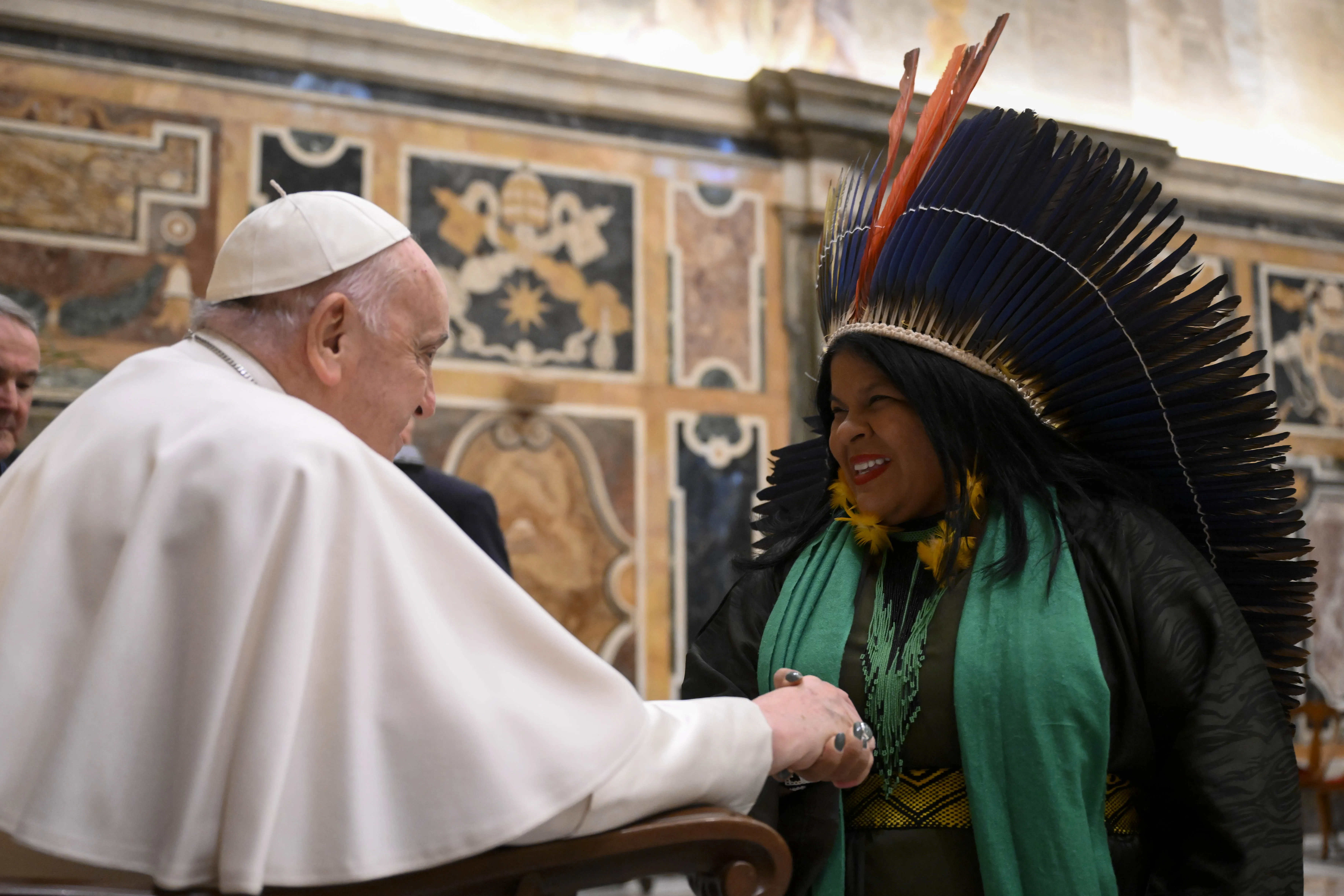
Rome Newsroom, Mar 15, 2024 / 10:20 am (CNA).
Pope Francis on Thursday reflected on the importance of holding up Indigenous voices and incorporating “ancestral wisdom” as part of broader efforts to mitigate the effects of anthropogenic climate change.
“Open dialogue between Indigenous knowledge and the sciences, between communities of ancestral wisdom and those of the sciences, can help to confront in a new, more integral and more effective way such crucial issues as water, climate change, hunger, and biodiversity,” the pope observed at the Vatican on Thursday. ‘“These issues, as we know very well, are all interconnected.”
The remarks were addressed to participants of the conference “Indigenous Peoples’ Knowledge and the Sciences,” sponsored by the Pontifical Academies of Sciences and Social Sciences, held at the Vatican from March 14–15.
This event brings together a plurality of voices from the pontifical academies, Indigenous groups, academics, and international organizations in order to evaluate how traditional Indigenous teachings and methodologies can be harmonized with conventional science to inform global policy on climate change, biodiversity loss, food security, and health.
According to the United Nations, Indigenous people are defined as those who “inhabited a country or a geographical region at the time when people of different cultures or ethnic origins arrived” and retain distinct “social, cultural, economic, and political characteristics” from their native societies.

“The Church is with you, an ally of the Indigenous peoples and their wisdom, and an ally of science in striving to make our world one of ever greater fraternity and social friendship,” the pope said on Thursday.
In the address, Francis pointed to a 2021 study by the Food and Agriculture Organization of the United Nations (FAO) that examined both Indigenous food systems and the inclusion of Indigenous knowledge as a core component of the United Nations’ 2024–2033 “International Decade of Sciences for Sustainable Development (IDSSD).”
The pope cited these as two concrete examples of how Indigenous representation has been developed on the international stage.
The pope stressed the importance of protecting Indigenous “cultures, traditions, spiritualities, and languages” as they form part of the “fabric of humanity,” and their loss would “represent an impoverishment of knowledge, identity, and memory for all of us.”
“For this reason,” the pope continued, “projects of scientific research, and accordingly investments, ought to be directed decisively to the promotion of human fraternity, justice, and peace, so that resources can be coordinated and allocated to respond to the urgent challenges facing the earth, our common home, and the family of peoples.”
The themes of ecological protection and human fraternity have been featured prominently in Francis’ pontificate.
In his seminal 2015 encyclical on climate Laudato Si’, Pope Francis emphasized the urgency of incorporating Indigenous voices in the broader discussion on climate change mitigation, noting those individuals “are not merely one minority among others, but should be the principal dialogue partners, especially when large projects affecting their land are proposed.”
According to the United Nations Development Program, the global Indigenous population sits at 370 million people — or 5% of the worldwide population — and is among the most vulnerable groups to the effects of anthropogenic climate change and its associated risks such as desertification, food scarcity, biodiversity loss, and forced migration.
If you value the news and views Catholic World Report provides, please consider donating to support our efforts. Your contribution will help us continue to make CWR available to all readers worldwide for free, without a subscription. Thank you for your generosity!
Click here for more information on donating to CWR. Click here to sign up for our newsletter.




Wow. It must be a 40-day-period of fasting when Satan is let loose to try his best to lead some astray. Every day his works tend more tawdry. Holy Jesus, we pray that nausea not overly sicken us.
Consider, however, the case of the Turkish farmer’s ancestral wisdom, and who in the early 20th Century actually tested the imposed methods of modern/progressivist agriculture and the U.N. experts against his own methods, in side-by-side fields. He found that it was better to NOT remove the rocks from his fields, because they retained in the hot and dry summer the meager moister needed for his seed crops to survive (reported, I think I recall, in Robert Heilbroner’s “The Future as History,” 1960). Rather, the papal proposition about ancestral things concrete calls for three other responses…
FIRST, how is the ancestral wisdom of long-term viability to be both respected AND freed from its pre-Christian or even pagan elements? The inculturation thing?
SECOND, why isn’t the Church’s Magisterium, itself, more respected by ersatz theological experts—as a “special case” of ancestral wisdom? Rooted not in concrete flora and fauna and the imagination, but instead in the divine self-disclosure in the incarnate Jesus Christ, the “concrete universal”?
THIRD, but, yes, in defense of gleanings from natural “ancestral wisdom”, we might also recall the Nobel Prize winning mathematician John Nash who augmented Adam Smith’s political economy with the algorithms of interactive Game Theory (portrayed in the movie “A Beautiful Mind,” 2001).
Maybe the complex interactions of game theory are a broader approach to ecological sustainability–simulated however imperfectly by techy computer modeling, toward the global future. Such that Pachamama-augmented “ancestral wisdom” is possibly more of a “special case”?
About what is to be marginalized and quarantined as special case, and what is not, we have the delightful ancestral wisdom and Magisterium-witness of the African bishops! And, now too the suddenly post-ecumenical Eastern Orthodox Church, and the Russian Orthodox Church. As well as Poland, Hungary (including the Orthodox Metropolitan Hilarion), Peru, and Kazakhstan, and parts of France and Germany and even Argentina. And, countless others who have had just about enough ideological signaling and indoctrination.
What about our “backwardist” ancestral wisdom in the Magisterium, and sustaining the cultural and ecclesial ecology?
Indigenous people are Wisdom Banks.